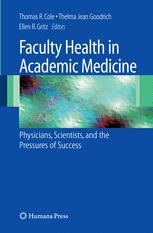

Most ebook files are in PDF format, so you can easily read them using various software such as Foxit Reader or directly on the Google Chrome browser.
Some ebook files are released by publishers in other formats such as .awz, .mobi, .epub, .fb2, etc. You may need to install specific software to read these formats on mobile/PC, such as Calibre.
Please read the tutorial at this link: https://ebookbell.com/faq
We offer FREE conversion to the popular formats you request; however, this may take some time. Therefore, right after payment, please email us, and we will try to provide the service as quickly as possible.
For some exceptional file formats or broken links (if any), please refrain from opening any disputes. Instead, email us first, and we will try to assist within a maximum of 6 hours.
EbookBell Team

0.0
0 reviewsThis ground-breaking new volume is the first of its kind to conceptualize and study the emerging field of faculty health and well-being in academic health science centers across North America. In Faculty Health and Academic Medicine: Physicians, Scientists, and the Pressures of Success, scholars already published in areas related to faculty health, as well as those primed to break new ground, have created a volume that will help define this new and evolving field. Recent years have brought the realization that clinicians and researchers in academic medicine, performing daily under high levels of stress, do so at great cost to their health. Socialized to diagnose and treat disease through biomedical science and technology, physicians often wall themselves off from emotional connection with their patients. Health does not thrive under these layers of pressures, and family and personal relationships are stretched under the need to constantly perform. Faculty Health and Academic Medicine: Physicians, Scientists, and the Pressures of Success draws from medicine, the social sciences, the humanities, and the arts. In addition to surveys, meta-analyses, and interviews, chapter data also calls upon history, literature, religious studies, and film to create a title that serves as a point of departure for understanding academic medicine and for designing new and innovative interventions to enhance faculty health.